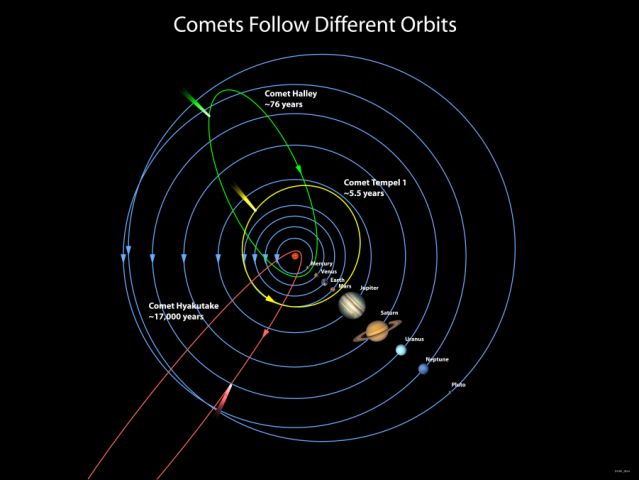1.30 recall that the moon orbits the Earth and that some planets also have moons
- Mars- 2 small moons
- Jupiter- 16 moons, some have volcanoes
- Saturn-more than 20 moons
- Uranus-15 moons
- Neptune-8 moons, one with volcanoes
1.31 understand gravitational field strength, g, and recall that it is different on other planets and the moon from that on the Earth
g: defined as the gravitational force acting per unit mass on an object. This is different on other planets and the moon compared to on Earth.
Planet
|
Surface
gravity (N/kg)
|
Mercury
|
4
|
Venus
|
9
|
Earth
|
10
|
-Moon
|
1.6
|
Mars
|
4
|
Jupiter
|
26
|
Saturn
|
11
|
Uranus
|
11
|
Neptune
|
12
|
This means that a 1 kg mass experiences a force of 10N on Earth due to Earth's gravitational pull.
Gravitational field strength is equal to the acceleration of objects under its influence. On Earth g = 9.8 m/s2.
This means that if an object was to fall freely (without air resistance) on Earth, its velocity would increase by
9.8 m/s for each second of it falling. So an object starting from rest would reach a velocity of 9.8 m/s after one second, and 19.6 m/s after two seconds etc.
But for most papers at the start they say assume g=10 m/s2 ...
Gravitational field strength is equal to the acceleration of objects under its influence. On Earth g = 9.8 m/s2.
This means that if an object was to fall freely (without air resistance) on Earth, its velocity would increase by
9.8 m/s for each second of it falling. So an object starting from rest would reach a velocity of 9.8 m/s after one second, and 19.6 m/s after two seconds etc.
But for most papers at the start they say assume g=10 m/s2 ...
1.32 Explain that gravitational force:
- causes the planets to orbit the sun
- causes the moon and artificial satellites to orbit the Earth
- causes comets to orbit the sun
The planets further away from the Sun travel more slowly because the further the distance away, the smaller the gravitational pull.
NB: There is a gravitational pull between all masses. Larger masses give a stronger pull. Every object is surrounded by its own gravitational field, which exerts an attractive force on all objects. As the Earth is greater than the moon, it attracts the moon and causes it to orbit the Earth, and 'g' on the moon is much smaller than on Earth.
Planets do not give out their own light. They just reflect the Sun's light.
1.33 use the relationship between orbital speed, orbital radius and time period:
Orbital
speed= 2 x π x orbital radius /
time period
v=
2 x π x r / T
1.34 describe how the orbit of a comet differs from that of a planet
Comets may be 'left-overs' from when the solar system was formed. They're lumps of ice, dust and gas. They have very elliptical orbits, which bring them close to the Sun and then far out in the solar system. When they fall near the Sun they speed up as the pull of gravity increases. The dust and gas are blown away from the Sun and shine in the sunlight, to form a long 'tail'.
(The orbit of each planet is not quite a circle. It is a slightly squashed circle called an ellipse, but a comet's orbit is much more obviously elliptical.)

1.35 recall that the solar system is part of the Milk Way galaxy:
- describe a galaxy as a large collection of billions of stars
- state that the universe is a large collection of billions of galaxies


electricity, circuits and current is invading helppppp!
ReplyDeleteim still confused about the parts from 2.9 to 2.20 <:(
ReplyDelete:( how? I try my best to explain but I'm not a teacher, just the average IGCSE student too. So maybe ask your teacher to explain first?
Deleteok :P
ReplyDeletei love how straight forward these notes are since all we really have to know are the basic specification points.. thanks so much for the help!! i've use almost every page :)
ReplyDeleteif i could like your comment, i would :P (y)
DeleteThis was so helpful, thanks so much! :)
ReplyDeleteExactly how important is astronomy in this course, cause there aren't many questions regarding this topic in past papers.
ReplyDeleteno there aren't.. but I don't want to say the wrong thing here, except that in my case, there wasn't a huge emphasis on astronomy..
DeleteI'm not kidding this blog has been a lifesaver! THANK YOU I'm planning on doing IB too! What subjects do you take?
ReplyDeleteyou're welcome!! science-wise I take HL Bio and Chem. :) what are you thinking of taking?
Deleteah physics is disgusting but these notes are really helpful
Deletegood
ReplyDeletegood
ReplyDeletevery helpful. thanks for this.
ReplyDeleteHi! I am from Macau! And I'm taking paper 2 for physics today. Honestly I do not have the book for IGCSE with me so your notes have helped me out a lot!! THANKS SO MUCH!!!
ReplyDelete